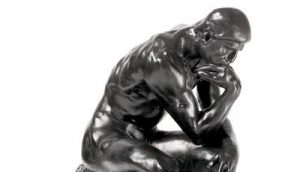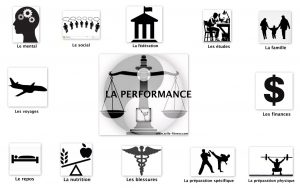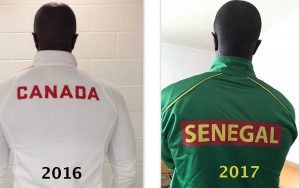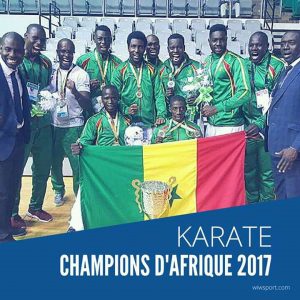CRITICAL THINKING: is the ability to reflect on your own actions and decisions within a given coaching/leadership context .
HOW AM I DOING? ARE MY METHODS STILL EFFECTIVE OR OBSOLETE ? HOW CAN I BE A BETTER COACH? DOES MY EGO GET IN THE WAY OF COACHING EFFECTIVENESS?

These are questions that help me step outside my comfort zone and help me grow. In my book, every coach should regularly look in the mirror, and ask themselves if their methods are working or are up-to-date , they should ask themselves if they are doing the best they can to optimize not only the performances of their athletes but also their potentiel as great human beings. In this profession, if you are not carful, your EGO could get in the way of your progress and critical thinking. In the last 20 years, i have seen too many coaches, karate “Masters”, technical leaders sailing off on their EGO TRIPS, and some of would take it a step further and blast off on their space ships, million miles from reality.
Coaching is a constantly evolving profession, and we can’t let our egos get in the way of our progression,. We have to do things for the right reasons which to help THE ATHLETES reach their full potential and acknowledge that we don’t know everything!
THE leadership practices inventory (James M Kouze and Barry Z Posner)
It is a process that is usually utilized by organizations to get information from diverse workplace sources on an employee’s work performance. Most often, information solicited in a 360-degree feedback process will include feedback from an athletes in our case, peers (colleagues), and Head coaches or Team managers etc…as well as a self-evaluation by the coach him or herself. I think all coaches should go through the 360 feedback process we have to go through as students in this program and the advanced coaching diploma because this exercise literally opened my eyes. I must admit i was always avoiding getting feedback from athletes, colleagues and technical leaders because i’m a very sensitive person. This is the exercise that got me to see how i was perceived as a coach, and leader by my athletes and peers. The process overall was nerve recking for me and later on led me to analyse the gap between how i perceived myself and how others in my work place percieved me.I went on to do some major adjustments. For instance, i didn’t know how to ask or when to ask feedback from athletes, all i did was just assume that they understood the tasks i gave them when they executed them well. But did they understand why they did that certain tasks? how did they feel doing them? I just told them what to do and i didn’t spend much time on the « why » and the « how » and i never asked them how they felt about the training sessions and what could be improved in their opinion .
I changed all that and started to empower them get them more involved in the training process and saw them having fun while work harder. As a coach i started to focus more on the “Why” and “How” and started to enjoy my work more. I kept the discipline, respect and work ethics of traditional karate but challenging myself to question the traditional way of teaching was the best decision i made for my coaching career.
I never perceived myself as a dictator but that is the style used. After more that 35 years of traditional karate that’s what i learned, the “master” is the supreme leader and his method should never get questioned by his disciples or pupils. It is a highly hierarchical system. But even though our sport is deeply rooted in traditional martial arts, it should be treated as a sport, and coaching athletes for performance is not the same as teaching karate in a “DOJO” ( the place we practice traditional karate). When you are used to being called “Sensei” or Master it can very easily go to your head if you are not careful. I think i started being a coach when i looked myself in the mirror and made the clear distinction between the sport, and the martial art, between the coach and the “sensei”. I became a coach when i found the guts to challenge my colleagues and head coach sometimes to think outside the box.
I refuse to be called Sensei in a sport setting anymore, the athletes i work with just call me coach! After the 360 experience, I sat down asked myself, why i was coaching? I realized that i wasn’t coaching for the right reasons. My father (RIP) always told me to do things for the right reason because sooner or later you are going to be exposed..At the heart of what we do is the athlete, once we forget that, we are not coaches any more in my opinion. I talk more with my athletes now, i pick there brain and try to find out more about their lives, because i understand now that for good and consistant performances the athlete has to have balance in his life. i design visual chart below

This chart is a constent reminder that is posted in my office: Seek balance for performance
The scale is at the center because it represents the right equilibrium, a good formula for success . All around this scale are all the major factors that influence performance, if one of them is affected it changes the balance of things, and there is a good chance your athlete’s performance is going to be affected. As coaches we have to know our athlete well in order to help him or her perform better, that is the list we could do. We have to acknowledge that there are things that are out of your control too, like their family, and private lives. I also realise that i have a lot of influence in a young person’s life and i make sure they understand my “Balance to perform concept” so they can make the right decisions for themselves. They also know that my door is always open if they need advice or just someone to listen to them. A coach also needs to have balance in his life to help others. I used to let athletes call or text me anytime, one time i received a text at midnight. It started to bring tensions into my marriage and i had to draw the line somewhere. I told all my athletes that 8 pm was the limit for texts and calls. My family is my number one priority!
CONCLUSION
The Ego can be a prison, that will keep the “coach” from improving . In a field that is constantly evolving, you will be left behind if you get stuck in that “prison”. i think that the cancer of coaching is rigidity or status quo. I’m coach because i have passion for karate(specially in it’s sport version), i’m a coach because i love teaching, inspiring and transmitting great values like discipline, good work ethics, dedication, and determination to young men and women. Hopefully these values will a help them in their lives after competition, and gear towards being model citizens and help them inspire others someday. As long as i am coaching, i vowed to regularly nourish my ability to reflect on my own actions and decisions in my working context, to never let my ego get in the way of seeking new effective ways to help the athletes feel good about themselves and perform better, to practice accoutability for everyone around me, including myself. The whole process started when i did my advanced coaching diploma and now with the HPCTL program i have to opportunity to take it a step further and develop towards my true potential as a coach.
08/09/17
In my last blog about this core competency, I talked about doing things for the right reasons and not letting our egos getting in the way of our decisions as coaches
. 
A few months have gone by since that blog post and I have been confronted with major decisions concerning my coaching career. When I started the HPCTL program my goal was to secure a job on the Canadian national team. I was an “event coach” on the national team and I was advocating an assistant coaching position because it did not exist at the time. Our national federation finally opened assistant coaching positions! Naturally, I applied thinking I had a very good chance of landing one, but unfortunately, I wasn’t chosen! My dream and my goal since 2005 was to be a coach on the national team and representing Canada all over the world helping athletes reach their goals.
So I started to go for my NCCP level 1, I was a coach on the provincial team for a year since 2004. I was extremely proud of being a provincial coach! Then eventually, I did my levels 2 and 3.
I became a permanent resident in 2008, it’s a long story but it took me 20 years to get my permanent resident status, the odds were against me but I persevered, that’s the story of my life and also the story of my coaching career.
I went on to be the first karate coach in Quebec to complete the comp-Dev coaching program, that meant that I was getting closer to my goal. In 2013 I applied to the National Coaching Institut in Quebec and got accepted and became the first karate coach in Quebec to be accepted at the Institut to complete the advanced coaching diploma since my mentor during my UBC program Mr. Gerard Lauzière.
In January 2014, I finally got my Canadian citizenship and a few months later I was chosen as an “event” coach for karate Canada and went on to represent Canada as a coach at the Pan American championships, it was one of the proudest happiest times of my life.
Fast forward to February 2017, I found out that I wasn’t selected as an assistant coach on the National team! I must admit that it was one of the most depressing times of my career. It forced me to think about my career, the impact I had as a coach on athletes, the people that I worked with and how I was perceived by the people making the decision, board members, administrators etc…
In the past, I rarely took the time to reflect on those things, and my program at UBC helped me realize that. I learned to develop my critical thinking skills! I also learned that by taking responsibility for our own coaching critical thinking processes, we are taking action to analyze and adapt our approach to decision-making and mostly problem-solving. By doing that we put ourselves in a much stronger position to lead and succeed in our profession.
Last April, I received a phone call by a French coach (of Senegalese origin) and he offered me an opportunity to work with him on the National team of Senegal! I met this man in 2012 at the world championships in Paris and he told me that he had been following me on Facebook because I posted a lot of training video’s and notes, and that wanted to work with me someday. Every time I saw him in international competitions we used to talk for hours about coaching in general and gap analysis! He was named the head coach for the national team in my country of origin and immediately thought of hiring me on the coaching staff!
So I was now faced with a big decision to make:
– Putting my career on hold for another chance to coach for Canada or stepping outside my comfort zone and taking the job on the Senegalese national team?

I’m from Senegal and very proud of the land of my forefathers but I have been living in Canada for the
past 32 years, I did all my professional career in this country, I’m about to graduate from UBC in high-performance coaching, I was forged in the Canadian system! I fought and sacrificed a lot to get my Canadian citizenship against all odds.
Decisions come with consequences, and I came analyze the impact of my decision on the I athletes of my own dojo that I started to develop. I also work with Canadian National team athletes on their strength and conditioning, I was still a provincial team coach and most of the athletes on that team are on the Canadian team…The word conflict of interest came to mind! So I consulted with a Leadership coach, Miss Dina Bell Laroche and this is what came out of that meeting:
topic: To ensure I am managing conflict of interest situations in accordance with my values
Main insights:
- Conflicts occur all the time. The key is to manage them in accordance with legal expectations, organizational policies and procedures and one’s values.
- Ensure that I am clearly communicating with all the parties so that everyone involved understands situations when I might be conflicted and the measures I will take to avoid or eliminate the conflict, including recusing myself.
- Create a “Code to live by” that is shared by all the coaches and athletes that can help people understand how they are to deal with situations, including conflict of interest, when it arises.
- Ensure that I am aware of the impact these situations might have on me and to provide the necessary self-care required to balance all the pieces
Biggest takeaways:
- Seek the advice of an expert legal counsel
I also consulted my athletes who were all happy for me and told me to go for it, told me that when one door is closed, the other is open!
Gerard Lauziere my mentor told me that many great Canadian coaches went abroad to coach and came back a few years later better than ever, so this is an opportunity that I couldn’t pass by.
I accepted the job, and unfortunately, I had to let go of my position as a provincial coach that I occupied for the past 13 years.
Last June I went to Yaoundé Cameroon for my first competition with the Senior team, and we had lots of success, it was the African Championships. We won a few individual medals and won the most important one, the Team competition against the host country in the final it was amazing! So I started off on a good foot! The athletes and the coaching staff welcomed me and accepted me with opened arms right away!
This is by far the best professional decision I ever made! I’m blessed and I seized a great opportunity and I’m extremely happy today.

In conclusion,
Critical thinking is the ability to deal with the contradictions and problems of a tumultuous and unstable field like high-performance coaching. The best decisions are made using an approach that is fair, objective, accurate and based on information that is relevant to the situation.
I think that if it wasn’t for my experience at UBC, I would have made lots of mistakes in this process but instead, I took the time to reflect on myself as a leader, as a coach and the impact I have on people around me (good or bad) and went out and sought advice from my peers from my cohort, my mentors, my athletes and of course my family and at the end of the day I’m happy and comfortable with my decision!